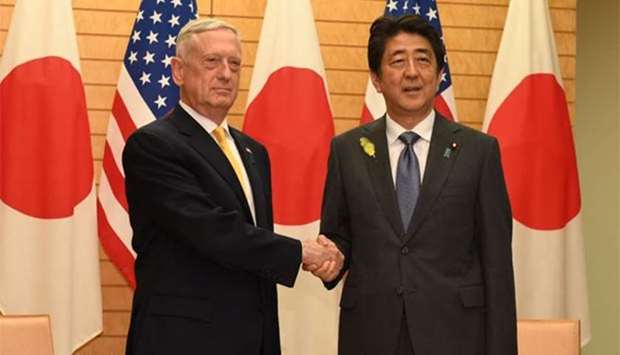US Defense Secretary James Mattis pledged on Friday to maintain and strengthen the US security alliance with Japan amid fears that talks with North Korea could water down Washington's longstanding security commitments in the region.
Mattis said the United States and its regional allies will maintain a "strong collaborative defensive stance" on North Korea, and that Japan will remain a "cornerstone" of regional stability.In meetings with Japanese officials, Mattis sought to address Tokyo's worries that its security interests could be left behind in President Donald Trump's push to reach a denuclearisation deal with North Korean leader Kim Jong Un.
"We're in the midst of very unprecedented negotiations right now with North Korea, but in this dynamic time, the longstanding alliance between Japan and the US stands firm," Mattis insisted next to his Japanese counterpart Itsunori Onodera.
"There is absolute reassurance between the two of us that we stand firm," he pledged.
Regional allies were caught wrong-footed by Trump's unexpected announcement on June 12 to suspend joint military exercises between the US and South Korea that had previously been seen as a vital measure to contain the North Korean threat.
Following the historic summit in Singapore between Trump and Kim, the US president said he wanted a halt to the drills, describing them as "expensive" and "provocative". But US allies did not appear to be forewarned.
Mattis said the decision was taken "to create space for our diplomats to negotiate strongly and increase the prospect for a peaceful solution on the peninsula."
"At the same time, we maintain a strong collaborative defensive stance, to ensure our diplomats continue to negotiate from a position of unquestioned strength," he said.
Onodera said the drills were "important for the stability of the region," but acknowledged that the decision to suspend them was valuable for diplomatic efforts to get Kim to give up his nuclear threat.
Japan and South Korea both feel a particular threat from Pyongyang's proven short and medium range ballistic missiles and its possession of chemical and biological weapons.
North Korea, which has previously vowed to sink the Japan into the sea, fired two test missiles over the island nation last year, with others splashing into the sea nearby.
Tokyo and Seoul fear US negotiations will focus on the intercontinental ballistic missiles that North Korea showed last year could reach US territory and potentially deliver a nuclear warhead, rather than shorter-range missiles.
Onodera called for Japan and the US to seek the dismantlement of all North Korea's weapons of mass destruction "and ballistic missiles of all ranges".
Mattis did not directly address that wish saying only that both sides should work to ensure the diplomats doing the negotiations were "backed up by a very firm military instrument".
Underscoring the point, he presented a blue tie with a Pentagon motif to Onodera, telling him "to remember you have a friend in the Pentagon".
He said the two sides had discussed "opportunities to increase our alliance's capability, to deepen our cooperation", though without offering details.
And he said the issue of Japanese kidnapped by North Korea, a highly emotive subject for Japan, was "a humanitarian issue always present in our deliberations".
Mattis arrived in Tokyo from South Korea, where he also sought to tamp down worries that Washington would let down its guard as the denuclearisation talks move ahead.
He said even with the cancellation of the exercises, Washington would be "maintaining the current US force levels on the Korean peninsula".
The US-South Korea alliance was "ironclad," Mattis stressed.

